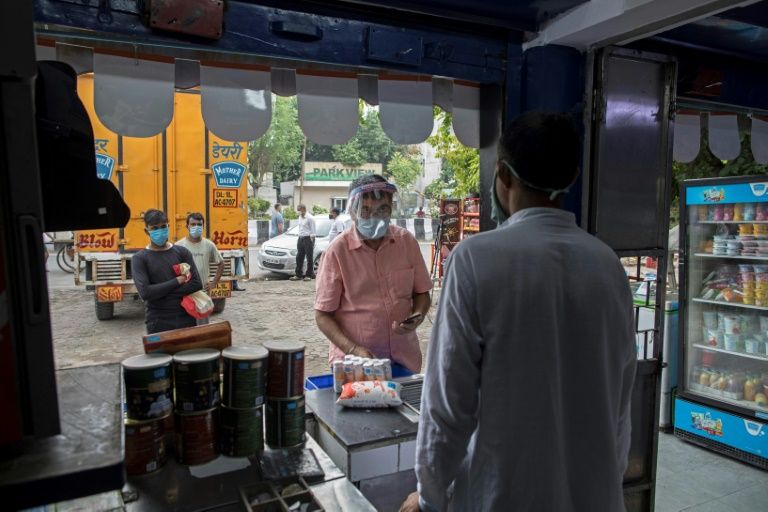Home remedies boom as India pandemic cases soar
New Delhi (AFP) – New Delhi housewife Sashi scoops Covid-19 “immunity-boosting” powder into a jug of water every morning for her family, joining a growing number of Indians who believe traditional supplements will help ward off the pandemic.
As India passes eight million cases — second in the world behind the United States — and the death toll exceeds 120,000, people are increasingly turning to ancient Hindu “ayurvedic” medicine.
And modern Indian consumer companies are cashing in on growing demand for alternative approaches, turning homemade therapies into packaged products such as turmeric milk and holy basil drops.
Sashi, 50, saw adverts on television for a herbal drink made by ayurveda and yoga tycoon Baba Ramdev “that can keep my family safe from the coronavirus”.
“I thought that since it’s been on TV, it must be good,” she said.
The pandemic has increased nervousness about the fragile state of India’s healthcare system.
Experts believe that, because of under-testing and under-reporting, the number of cases and deaths is much higher that officially reported.
There is no scientific evidence that ayurvedic treatments can prevent the coronavirus.
But the sector had already been massive before the pandemic, with people believing claims that natural remedies can cure everything from cancer to the common cold.
It is now worth $10 billion a year, according to the Confederation of Indian Industry.
Ayurveda practitioner Bhaswati Bhattacharya said the lack of a coronavirus vaccine and other conventional treatments has driven the rush towards familiar natural remedies.
“Ayurveda has been written for 5,000 years and been around probably for twice that at least. It’s lived through plagues, smallpox and pandemics, so people are saying, ‘Let’s see if it works’,” she told AFP.
– No magic pill? –
The rising interest in ayurveda — the “science of life” in Sanskrit — and other therapies has also been encouraged by Prime Minister Narendra Modi’s Hindu nationalist party, which set up a dedicated ministry in 2014.
In January, the Ministry of AYUSH (Ayurveda, Yoga & Naturopathy, Unani, Siddha, Sowa Rigpa and Homeopathy) touted traditional remedies as a means to combat the coronavirus.
More recently, Health Minister Harsh Vardhan released guidelines for treating some asymptomatic and mild Covid-19 sufferers with ayurveda and yoga.
At chemist shops, ayurveda products are displayed as prominently as pharmaceutical drugs.
Mother Dairy, a leading milk producer, said there has been a “phenomenal” consumer response to its recently launched turmeric milk for children.
“The demand is very, very high so we are ramping up the production and distribution,” Mother Dairy’s products chief Sanjay Sharma told AFP.
“Health and immunity-led products are a new phenomena. This is an opportunity… to provide precautionary healthcare for consumers at a very affordable price.”
Philipe Haydon, chief executive of Himalaya Drug Company — a major producer of herbal pills and creams — said demand for wellness and immunity products was up to 10 times higher than before the pandemic.
But the hungry for alternative treatments has also fuelled controversial and pseudoscientific claims to have found Covid-19 “cures”.
Although there is no scientific evidence, several politicians from Modi’s Bharatiya Janata Party have advocated using cow dung and urine to cure the virus.
And in June, the AYUSH ministry ordered yoga guru Ramdev, who has turned his Patanjali company into one of India’s best-known brands, to stop marketing his “Coronil” herbal remedy as a cure.
The Indian Medical Association has also called on the health minister, himself a doctor, to provide evidence that ayurveda and yoga are effective in treating the virus.
“None of them provide any specific protection against Covid-19,” Anand Krishnan, a community medicine professor at the All India Institute of Medical Sciences in New Delhi, told AFP.
“It is more important for people to follow the measures of social distancing, masking and hand-washing.”
Disclaimer: Validity of the above story is for 7 Days from original date of publishing. Source: AFP.


